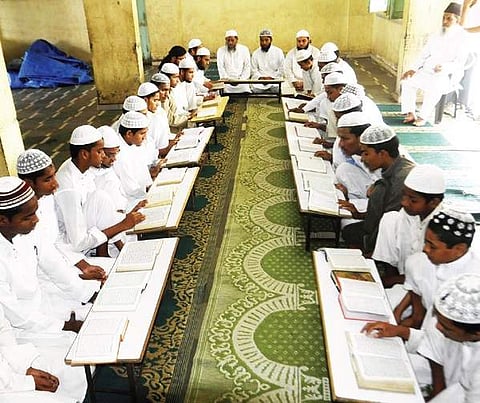

DEHRADUN: As the sun is about to set, Mufti sahab and about 20 youngsters are about to end their impromptu ‘chai pe charcha’ and go for evening prayers. Seated on the verandah inside the Madrasa Arabia Rahmania in Roorkee, they have been discussing religious affairs and other issues. As the conversation veers towards Sanskrit and Ayurveda, Mufti sahab appears uncomfortable. “Chaliye... namaz ka waqt ho gaya hai (let’s go, it is time for namaz),” he declares.
A proposal to make Sanskrit an optional language in madrasas across Uttarakhand — lying on the table of Chief Minister Trivendra Singh Rawat at present — has not only sparked off a debate among the Islamic scholars, it seems to have divided the younger generation from the traditional and older Muslims.
While young men and women have welcomed the move, the older generation has termed it an attempt at ‘saffronising’ Islamic institutions.
“I doubt the intent of the BJP government… Their intent seems to be to saffronise Islamic institutions and project it as a victory before the next elections,” says Mufti Mohammed Masoom, the principal of Madrasa Arabia Rahmania.
However, the young caretaker in the same madrasa, Mohammed Aftab, thinks differently.
“It is a welcome move and will help students pursue a career in Ayurveda… There is nothing wrong if we learn a new language,” he says, as the elderly Mufti questions what the government has done to promote Urdu.
Shaheen, a pupil of Madrasa Razia Sultan in Gadarpur in Udham Singh Nagar, says when girls her age were studying Sanskrit in other schools, why should they be left behind? “I want to do Bachelor of Ayurvedic Medicine and Science, for which knowledge of Sanskrit is necessary…. We need Sanskrit in madrasas.”
The Madrasa Welfare Society of Uttarakhand, which governs 297 madrasas spread across Udham Singh Nagar, Dehradun, Roorkee and Nainital among other places in the state, had recently proposed that Sanskrit be introduced under the centrally funded Scheme for Providing Quality Education in Madrasas (SPQEM).
Asked why he moved the proposal, the chairman of the Madrasa Welfare Society Sibte Nabi told Express that during one of his visits to Ishrat ul Haq madrasa in Haldwani, a student had told him he wanted to learn Sanskrit so he could become an Ayurvedic doctor.
“Out of 297 madrasas, 207 have given their consent… We already teach Hindi, English, science and maths, besides the Deeni Taleem (religious subject). If Sanskrit too is made optional, it will benefit students immensely,” says Nabi.
“Both Ayurveda and Yoga are so much in demand that there is a need for qualified experts. This is where Sanskrit comes in handy.”
Asked if the proposal had something to do with saffron politics, Nabi is dismissive. “When the madrasas themselves are willing, where is the question of saffron politics?”
The Deputy Registrar of Uttarakhand Madrasa Education Board, Akhlaq Ahmed, told Express that the board’s lower committee had already cleared the proposal and that it would shortly be sent to the upper committee.